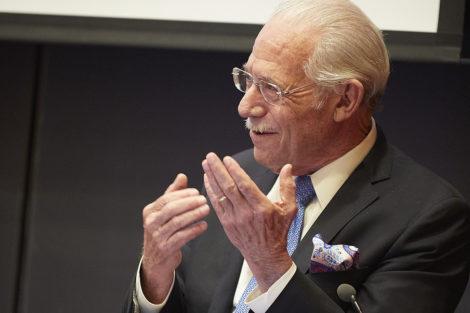September 23, 2019 – William Haseltine wants to figure out how bring the benefits of modern medicine to people everywhere.
That’s why he founded ACCESS Health International, a nonprofit aimed at improving access to high quality health care worldwide. And in a new book, Haseltine profiles NYU Langone Health and the lessons it learned while undergoing a transformation from a poorly performing health system to one that’s now world-class.
Haseltine spoke about his new book, “World Class: A Story of Adversity, Transformation and Success at NYU Langone Health,” at a Dean’s Distinguished Lecture at Harvard T.H. Chan School of Public Health on September 18, 2019, before a full house in Kresge G2.
In her introduction, Dean Michelle Williams spoke about Haseltine’s career in science, business, and philanthropy. He was a professor at Harvard Medical School and Harvard Chan School from 1976 to 1993, where he founded and chaired two academic research departments, in biochemical pharmacology and human retrovirology; is known for groundbreaking work on cancer, HIV/AIDS, and genomics; and founded more than a dozen biotechnology companies.
Haseltine’s book focuses on what can be done to bring academic medical centers from mediocre to “best in class.” About 12 years ago, he said, NYU Langone Health was rated poorly in quality and safety, its research budget was sinking, and it was in financial trouble. But, today, the system gets top marks for quality and safety, for its medical school, and for the amount of research dollars, per capita, it receives from the National Institutes of Health.
How did NYU Langone Health achieve this dramatic transformation? One way was by installing a top-notch board of directors, with a strong chair and a strong CEO, Haseltine said. In addition, the health system improved quality and safety by focusing on the patient. In part, that was achieved by boosting employee morale. “If the people who work for you have a good feeling, from the janitors to the nurses’ assistants to the nurses and on up—that everybody is treated equally with respect for what they do—they’ll treat the patient the same way,” said Haseltine.
NYU Langone Health also significantly expanded the number of its outpatient centers, which made accessing health care easier for patients, reduced infection rates (because at outpatient centers, patients aren’t in close proximity to lots of other patients), and cost less (because running an outpatient center is cheaper than running a whole new hospital). “It’s a better system,” Haseltine said, noting that 95% of NYU Langone Health’s profits come from outpatient services.
Haseltine also discussed how NYU Langone Health’s development of a comprehensive and transparent data information system helped improve quality. For example, the system contains a wealth of information on doctors’ performance, including things like how many minutes emergency room doctors work on a particular patient or how many units of blood doctors use in surgery. The database enables doctors to compare their own performance to that of their colleagues. As a result, said Haseltine, “Many of the [doctors] go to the guys who are performing better and say, ‘Please help me.’”
Haseltine thinks that the strategies used to dramatically improve the situation at NYU Langone Health can provide a template for other health systems, both in the U.S. and abroad.
photo: Kent Dayton
